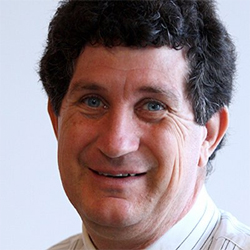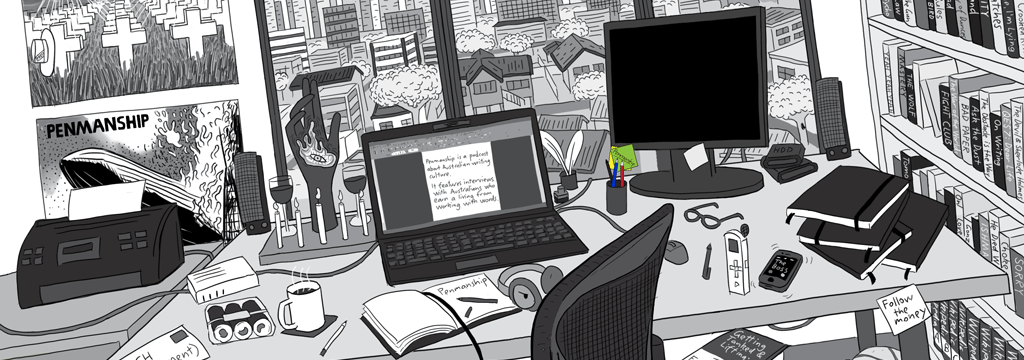Tony Moore is a senior reporter at Brisbane Times.
 He was one of the original team recruited to work at Fairfax Media’s new online news outlet when it was launched in 2007, and today he remains one of only a couple of reporters who has worked at Brisbane Times since its inception. Before that role, though, Tony has enjoyed a long career as a journalist in Queensland. I first met him about a year ago, when I sent an email to ask whether he’d be open to sharing one of his sources with me for a story I was working on. This type of request can go either way, as some journalists are extremely protective of their sources and wary of sharing with their workmates, let alone a freelancer like myself, but the fact that Tony welcomed me with open arms says a lot about his character.
He was one of the original team recruited to work at Fairfax Media’s new online news outlet when it was launched in 2007, and today he remains one of only a couple of reporters who has worked at Brisbane Times since its inception. Before that role, though, Tony has enjoyed a long career as a journalist in Queensland. I first met him about a year ago, when I sent an email to ask whether he’d be open to sharing one of his sources with me for a story I was working on. This type of request can go either way, as some journalists are extremely protective of their sources and wary of sharing with their workmates, let alone a freelancer like myself, but the fact that Tony welcomed me with open arms says a lot about his character.
We met at his home in the inner-city suburb of West End on a Friday afternoon in March, when he and his Brisbane Times colleagues happened to be on strike for the day, in solidarity with their colleagues in Sydney and Melbourne, after Fairfax Media announced plans to cut 120 full-time equivalent jobs from newsrooms at The Sydney Morning Herald and The Age. We began by speaking about what these job losses will mean for consumers of Australian journalism, before moving on to discuss Tony’s early interest in environmental sciences, and the link he has noticed between science and journalism; his early years working at The Queensland Times in Ipswich, where he saw the rise of an influential figure in Australian politics from up close; the character traits he has observed about the young reporters who excel in this business; why he lost the ability to speak for several months, and how he overcame this affliction; and how a long-running series of stories led to the funding of a major Queensland infrastructure project.
Tony came to Fairfax Media and Brisbane Times after working at The Queensland Times in Ipswich where he worked as a reporter, chief of staff and deputy editor over 14 years. At Ipswich he started affairs with the Ipswich Motorway, southeast Queensland’s population growth and how Brisbane and Ipswich needed to play nicely together. They are affairs which continue to this day, though he is yet to tell his wife and two daughters, who are more interested in netball, basketball, circus and the rebuilding of the Brisbane Lions. Tony is a cricket tragic who realised early in his career that being straight-driven for six was less than encouraging for a Brisbane swing bowler. It took a ceremonial hip and shoulder bump to end his career as a young ruck-rover spreadeagled along the boundary fence at Wests at Chelmer. He remembers The Stranglers and Xero at Festival Hall, The Birthday Party at Souths Leagues Club and the Royal Exchange Hotel when it was a Triple Zed venue. Dimly. Tony was born and still lives in Brisbane, went to Queensland University of Technology and Griffith University.
Tony Moore on Twitter: @eastTMoore
Direct download | iTunes | Stitcher | Libsyn | YouTube
Timeline:
3.30 Tony says the planned Fairfax Media redundancies won’t be immediately felt at the Brisbane Times, since it doesn’t have a print product, but he and the rest of the Brisbane reporting staff went on strike on Friday, March 18 in solidarity with their southern colleagues
4.30 “Fairfax cut 800 journalists not so long ago; it’s staggering when you think about it”
5.30 “We understand the move to digital; I mean, Brisbane Times is a digital-only site, and we do it very well, we believe”
8.00 Tony began his journalism career at Australian Provincial Newspapers (APN) in Ipswich, which is where he first encountered strike action that led to setting better conditions for he and his colleagues
10.30 He’s unsure whether the average news consumers realise the extent of what the planned Fairfax newsroom cuts will mean for the quality of the content available to readers
11.30 “I don’t think they understand the implications of cutting 120 journalists’ jobs, plus freelancers jobs […] The average punter will lose out very, very badly, to be honest. They won’t get the diversity of ideas, or the opportunity to get a second read on a story”
13.00 One side effect of shrinking newsrooms is that many journalists tend to end up working in the corporate communications industry
14.30 Tony was born in Sherwood, in Brisbane’s inner-west; his father was a mechanic, and his mother a housewife
16.00 He went to Corinda High School, studied environmental sciences at Griffith University, “ran away to Sydney to join a rock band”, then came back to Brisbane to study journalism and script-writing at the Queensland Institute of Technology (now named QUT)
19.00 His tutors at university were former reporters who had elected to teach the next generation of journalists, back when journalism degrees were still a fairly new proposition at Australian universities
22.30 For Tony, the link between science and journalism is in terms of verification: “It’s not always overt, but you should apply a sense of scientific rigour to an explanation [provided by a political party]”
26.30 “In the political arena, it does seem to be largely rhetoric; [in] the current debate about Queensland’s infrastructure plan, mate, there isn’t an infrastructure expert among the Katter boys!”
28.00 Tony doesn’t think his journalism degree prepared him well for his first job as a reporter on The Queensland Times, because it’s the kind of field where you learn the most while on the job
30.00 On Tony’s first day at the job, a Queensland Times photographer left him at a job, because he asked what the photographer considered to be a dumb question
32.30 “He was rough as guts, but he was teaching me… the hard way!”
34.30 While reporting in Ipswich, Tony saw the rise of Pauline Hanson as a national political figure, fronting the far-right One Nation party
37.30 There was a sense of incredulity among local Ipswich reporters who watched Pauline Hanson’s rise from a nobody to an influential national entity
43.30 Tony talks about his year in Sydney, playing guitar and bass in a rock band, dirt-poor and attempting make it as a musician before totalling his friend’s car and taking a job in journalism to pay him back
46.00 How Tony went about gaining confidence and learning how to ask dumb questions as a reporter
47.00 “At press conferences, there’s lots of big egos, lots of big personalities; I’m not a big ego, I don’t have a big personality”
48.30 At The Queensland Times, Tony started as a cadet, working on weekends, gradually filling up his contact book
53.00 Tony eventually became chief of staff at the newspaper; “the person who runs the day-to-day assignments”
54.30 While spending 15 years at the newspaper, Tony began noticing that the best young reporters were those who were the most interested in asking questions, and asking “why?”
57.30 Tony had four months off work at The Queensland Times after he lost the ability to speak, as a result of stress: “I couldn’t talk; I literally lost my voice”
58.30 “It’s literally a small mental illness, to be honest: stress produces that in you”
6.000 One of Tony’s passion projects as a journalist was to campaign for the development of the Ipswich Motorway, which involved writing “hundreds of stories” over two or three years
62.30 “A regional daily newspaper can be a very, very powerful place to learn your trade as a journalist, and you can make a big difference to a community if you do your job well”
63.00 After The Queensland Times, Tony went into the public service and worked for the Department of Transport and Main Roads for four or five years, before he was approached to be a part of the founding staff at Brisbane Times in 2007
66.30 “We really felt like a small start-up business in the early days […] But we’ve just become a mature newsroom these days”
68.30 “When we first started, people always thought it was a nonsense before we started the paper”
69.30 In January 2011, Tony’s house in West End, Brisbane was heavily flooded while he and his family were holidaying in New Zealand, so their friends emptied their house and cleaned it up as best they could in the Moores’ absence
72.00 “It took from January through to November to get back into the house […] Fairfax helped me with funny shifts, and they arranged a card with some grocery money on it, which was lovely”

